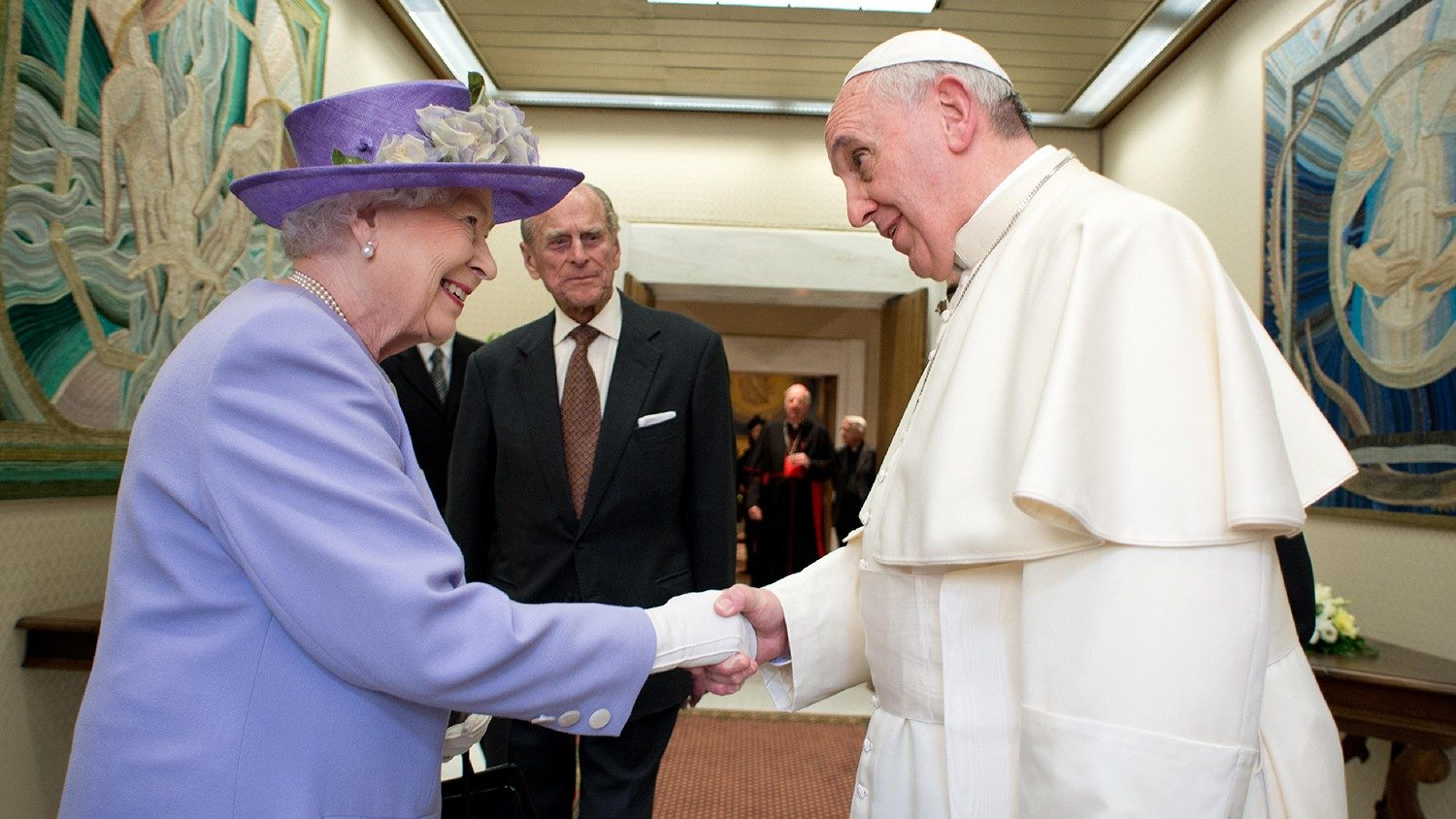Photo above – Queen Elizabeth meets Pope Francis in 2014
The British Embassy to the Holy See hosted afternoon tea in honour of Queen Elizabeth’s birthday by recognizing Church’s contribution in tackling Covid-19.
HE Sally Axworthy, British Ambassador to the Holy See, held a virtual tea party on Tuesday afternoon to honour Queen Elizabeth on her 94th birthday, celebrated on 13 June. Roughly 120 people participated from different parts of the world, including other fellow Ambassadors to the Holy See. The event was transmitted from the headquarters of the International Union of Superiors General (UISG) in Rome.
Interdependence
After introductions by the Ambassador, Lord Ahmad of Wimbledon, Minister of State, Foreign and Commonwealth Office greeted the participants via a pre-recorded video message. He underlined the role the Catholic Church plays throughout the world, especially in developing countries. While some members of the Church have lost their lives serving on the front lines, he said many more lives have been saved due to their dedication. Lord Ahmad described the UK government as a “partner” with the Catholic Church on a number of issues, human trafficking, modern slavery, freedom of religion and preventing sexual violence in conflict among them. Covid-19 has taught us that all people are interdependent, regardless of religious persuasion, he said.
Witnessing God’s love through service
Speaking on behalf of women religious, UISG President, Sr Jolanta Kafka spoke of the “holy ‘disquietude’ shaking us. But we are sure of the presence of God’s spirit always moving us toward transformation”. It began with a day of prayer and solidarity on 22 March. “The need of prayer brings us to humility to raise our voices and realize that not everything depends on us”, Sr Jolanta said. The UISG, she said, has been focusing efforts on mutual support and helping member communities to reflect “on what is happening and how to move forward”. She summarized how the UISG has been reaching out to its member communities with the “creativity of compassion” so as to respond to so many needs “with the possibilities we have”. This circumstance, like so many others, will bring new fruitfulness, Sr Jolanta said. The invitation is “to deepen the essence of our vocation” which is witnessing God’s love to humanity through service.
Recognising the gravity of the situation
Sr Jolanta was followed by her male counterpart, Jesuit Superior General, Father Arturo Sosa. He noted both visible and invisible ways that religious are contributing to alleviate the Covid-19 crisis. One of the invisible ways is that of “recognising and taking up the gravity of the situation”, he said. Visible ways contribute to the “struggle to change world structures perpetuating cycles of injustice”. “We feel most to go to those who are cast aside”. These are the reasons why “religious life is necessary to the future of humanity”, Father Sosa stated.
Britain’s contributions
In her own speech, Ambassador Axworthy mentioned the ways that the British Government is playing an active role in combatting the Covid-19 virus. She mentioned Britain’s role in the hosting the Global Vaccine Summit in June to which the UK is the highest contributor. Clinical trials of a vaccine, she said, have begun and “When a vaccine comes, it should be available to everyone”, she said. Coupled with vaccine development is Britain’s commitment to developing countries in the form of aid.
Light and life amidst darkness and death
Then the Ambassador directed her words to what the Church is doing in “ways the UK cannot match”. Among them was Pope Francis who “gave us hope in the darkness of the first days when it struck”; his special Urbi et orbi prayer in March in which he reminded us that “we are all in the same boat”; his daily Masses, in which he mentioned and interceded for “the many unsung heroes”. “We were privileged to join him daily for his reflections during this time”, she said. As the world’s “largest non-state provider fighting the disease”, Axworthy mentioned the St Egidio community and Pope Francis’s Jesus the Divine Worker fund benefiting Rome’s unemployed population. She “looks forward to the guidance of Pope Francis” through the Covid-19 Commission he established, so as not to return to ways of the past, but so that Britain too might contribute to making the world better. “Today we want to say thank you for the church and people of faith for tackling Covid-19”, she said. Lastly, she explained that UK sponsored donations have benefited 5 Catholic charitable organizations. The money that would have been spent on a live tea party, she said, is going toward a food donation to people in Northern Italy. Lastly, she quoted Queen Elizabeth’s Easter Message: “As dark as death can be, life and light are better”. “Thanks to everyone for sharing light and life”, Axworthy concluded.
Common vocation to service
Lastly, Archbishop Paul Richard Gallagher, the Vatican’s Secretary for Relations with States addressed the participants. He said that Queen Elizabeth herself has been a source of “encouragement and inspiration” and that the UK has been “blessed by her example of service”. “In present crisis, she has offered words of resolve and comfort. Her empathy with the sufferings of so many is and always has been heartfelt”, the Archbishop said.
Turning to the world at large, the Archbishop said “the whole world has been shaken from what it takes for granted. Reflection shows that there is need of conversion. False securities are falling away in the earthquake of these times”. “Jesus came to serve not to be served”, the Archbishop quoted. “His followers can only humbly imitate such an example”. Pope Francis’s image of the Church as a field hospital is appropriate for how the Church has responded in service through its many local institutions to the Covid-19 pandemic, the Archbishop continued. The Covid-19 Commission that the Pope established is “looking to future with creativity”, he said, and hopes to “launch a common dialogue” in its support of local initiatives.
DraggedImage.77451ff0e674448e82cc9db6edc2931d.png



